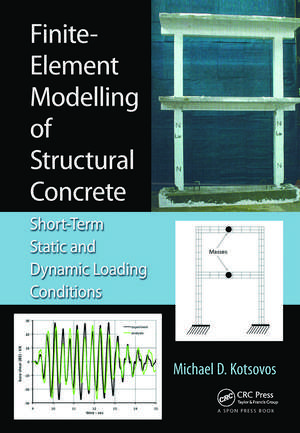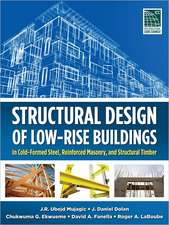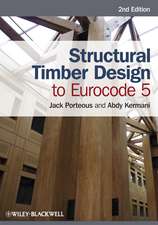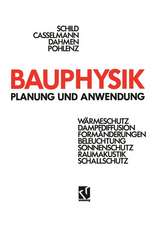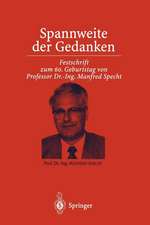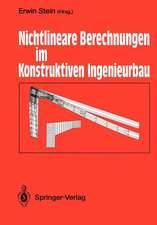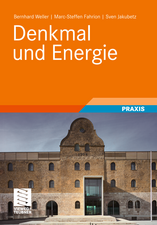Finite-Element Modelling of Structural Concrete: Short-Term Static and Dynamic Loading Conditions
Autor Michael D. Kotsovosen Limba Engleză Hardback – 20 mai 2015
Finite-Element Modelling of Structural Concrete: Short-Term Static and Dynamic Loading Conditions presents a finite-element model of structural concrete under short-term loading, covering the whole range of short-term loading conditions, from static (monotonic and cyclic) to dynamic (seismic and impact) cases. Experimental data on the behavior of concrete at both the material and structural levels reveal the unavoidable development of triaxial stress conditions prior to failure which dictate the collapse and ductility of structural concrete members. Moreover, and in contrast with generally accepted tenets, it can be shown that the post-peak behavior of concrete as a material is realistically described by a complete and immediate loss of load-carrying capacity. Hence rational analysis and design of concrete components in accordance with the currently prevailing limit-state philosophy requires the use of triaxial material data consistent with the notion of a fully brittle material, and this approach is implemented in the book by outlining a finite-element method for the prediction of the strength, deformation, and cracking patterns of arbitrary structural concrete forms.
Presents a Unified Approach to Structural Modeling
Numerous examples are given that show both the unifying generality of this proposed approach and the reliability of the ensuing numerical procedure for which the sole input is the specified uniaxial cylinder compressive strength of concrete and the yield stress of the steel. This not only offers a better understanding of the phenomenology of structural concrete behavior but also illustrates, by means of suitable examples, the type of revision required for improving design methods in terms of both safety and economy.
This book:
- Highlights the significance of valid experimental information on the behavior of concrete under triaxial stress conditions for interpreting structural behavior
- Describes the techniques used for obtaining valid test data and modeling concrete behavior
- Discusses the modeling of steel properties as well as the interaction between concrete and steel
- Presents numerical techniques for incorporating the material models into nonlinear finite-element analysis for the case of short-term static loading
- Provides numerical techniques adopted for extending the use of the numerical analysis scheme for the solution of dynamic problems
- Predicts the response of a wide range of structural-concrete configurations to seismic and impact excitations
| Toate formatele și edițiile | Preț | Express |
|---|---|---|
| Paperback (1) | 585.27 lei 6-8 săpt. | |
| CRC Press – 26 iul 2017 | 585.27 lei 6-8 săpt. | |
| Hardback (1) | 1395.65 lei 6-8 săpt. | |
| CRC Press – 20 mai 2015 | 1395.65 lei 6-8 săpt. |
Preț: 1395.65 lei
Preț vechi: 1702.01 lei
-18% Nou
Puncte Express: 2093
Preț estimativ în valută:
267.05€ • 279.58$ • 220.97£
267.05€ • 279.58$ • 220.97£
Carte tipărită la comandă
Livrare economică 05-19 aprilie
Preluare comenzi: 021 569.72.76
Specificații
ISBN-13: 9781498712309
ISBN-10: 1498712304
Pagini: 382
Ilustrații: 307
Dimensiuni: 178 x 254 x 25 mm
Greutate: 0.86 kg
Ediția:1
Editura: CRC Press
Colecția CRC Press
ISBN-10: 1498712304
Pagini: 382
Ilustrații: 307
Dimensiuni: 178 x 254 x 25 mm
Greutate: 0.86 kg
Ediția:1
Editura: CRC Press
Colecția CRC Press
Cuprins
Need for a reappraisal. Main behavioural characteristics of concrete. Modelling of concrete behaviour. Structure modelling for static problems. Finite-element solutions of static problems. Extension of finite element modelling to dynamic problems. Reinforced concrete structural members under earthquake loading. Structural concrete under impact loading. A: Octahedral formulation of stresses and strains. B: Coordinate transformations.
Notă biografică
Michael Kotsovos is a senior research fellow, and former professor and head of the Structures Department, at the National Technical University of Athens. He was formerly a consultant to Jan Bobrowski and Partners; Rendel, Parmer and Tritton; and Taywood Engineering in London; followed by several years as a lecturer at Imperial College London, UK.
Recenzii
"This book provides a comprehensive and reliable treatment of the finite element analysis of reinforced concrete structures on the basis of well-founded material properties adopted on the basis of experimental results after a critical evaluation by the author according to his personal research. The strictness of the approach regarding the effective triaxial concrete behaviour forms a safe basis for the development of the finite element procedure in analyzing various reinforced concrete structures under static and dynamic loading including the seismic design."
Leonidas Stavridis, National Technical University of Athens
Leonidas Stavridis, National Technical University of Athens
Descriere
This book presents a finite-element model of structural concrete under short-term loading. It outlines a finite-element method for the prediction of the strength, deformation, and cracking patterns of arbitrary structural concrete forms under a wide range of loading conditions. It also includes numerous examples that show both the unifying generality of this proposed approach and the reliability of the ensuing numerical procedure for which the sole input is the specified uniaxial cylinder compressive strength of concrete and the yield stress of the steel.
